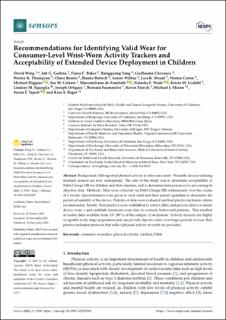Recommendations for Identifying Valid Wear for Consumer-Level Wrist-Worn Activity Trackers and Acceptability of Extended Device Deployment in Children
Wing, David; Godino, Job G.; Baker, Fiona C.; Yang, Rongguang; Chevance, Guillaume; Thompson, Wesley Kurt; Reuter, Chase; Bartsch, Hauke; Wilbur, Aimee; Straub, Lisa K.; Castro, Norma; Higgins, Michael; Colrain, Ian M.; de Zambotti, Massimiliano; Wade, Natasha E.; Lisdahl, Krista M.; Squeglia, Lindsay M.; Ortigara, Joseph; Fuemmeler, Bernard; Patrick, Kevin; Mason, Michael J.; Tapert, Susan F.; Bagot, Kara S.
Journal article, Peer reviewed
Published version

Åpne
Permanent lenke
https://hdl.handle.net/11250/3059342Utgivelsesdato
2022Metadata
Vis full innførselSamlinger
- Department of Informatics [928]
- Registrations from Cristin [9791]
Sammendrag
Background: Self-reported physical activity is often inaccurate. Wearable devices utilizing multiple sensors are now widespread. The aim of this study was to determine acceptability of Fitbit Charge HR for children and their families, and to determine best practices for processing its objective data. Methods: Data were collected via Fitbit Charge HR continuously over the course of 3 weeks. Questionnaires were given to each child and their parent/guardian to determine the perceived usability of the device. Patterns of data were evaluated and best practice inclusion criteria recommended. Results: Best practices were established to extract, filter, and process data to evaluate device wear, r and establish minimum wear time to evaluate behavioral patterns. This resulted in usable data available from 137 (89%) of the sample. Conclusions: Activity trackers are highly acceptable in the target population and can provide objective data over longer periods of wear. Best practice inclusion protocols that reflect physical activity in youth are provided.
